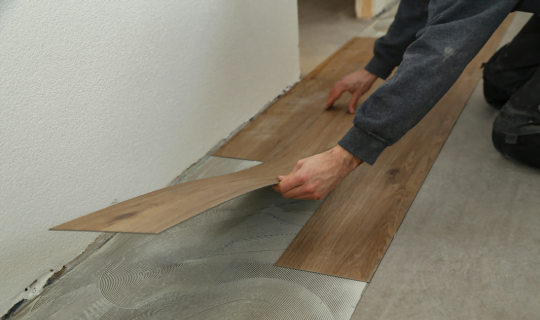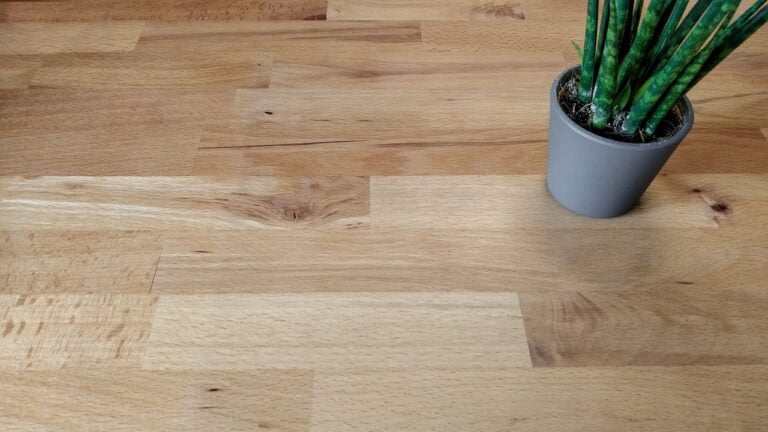Uncover Top Vinyl Flooring: Types, Brands, Costs Revealed!
When it comes to home renovation or remodeling, choosing the right flooring is an important decision. Vinyl flooring has become a popular option in recent years, thanks to its durability, affordability, and low maintenance. But with so many types, brands, and costs available, it can be overwhelming to make a decision.
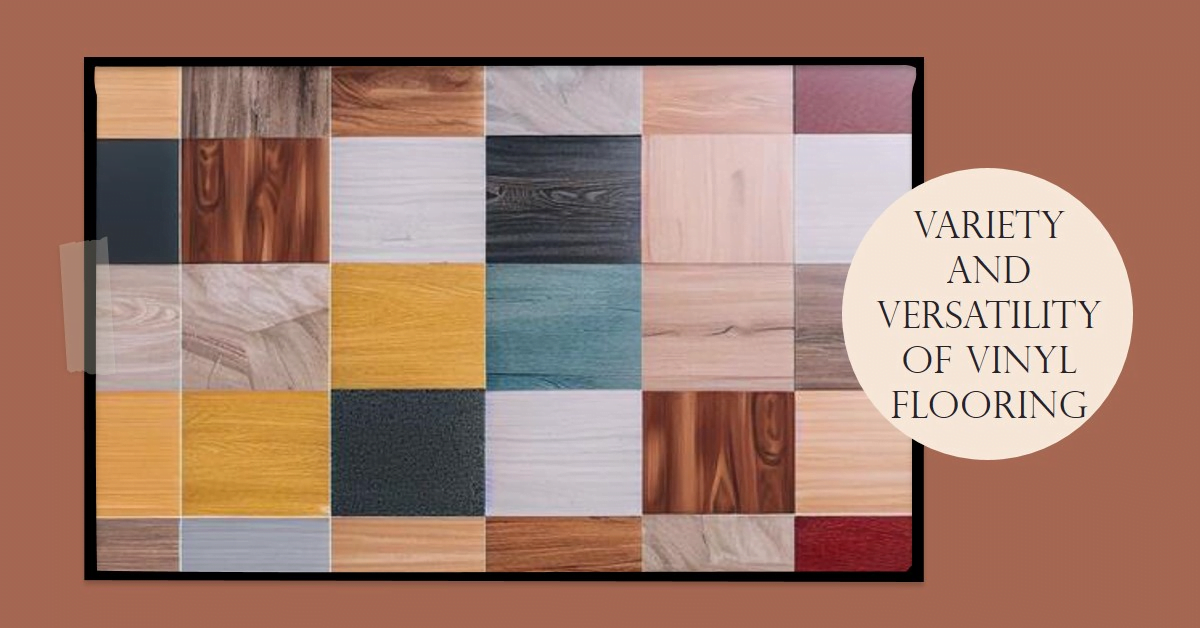
In an environment where aesthetic design and functionality come together to create our ideal interiors, flooring plays a crucial role in enhancing the overall appeal of our homes or workplaces. Among numerous alternatives, vinyl flooring has arisen as a favoured choice among homeowners and designers alike, attributed to its durability, versatility, and reasonable cost.
In this post, we venture on an extensive examination of this prominent flooring option. We’ll explore various categories, top-ranking brands, and consider price points, thereby providing a thorough guide to assist you in making the best-informed decision. Whether you’re refurbishing your space, planning a new one, or just fascinated by interior design trends, this piece promises an engaging read, demystifying the complex world of vinyl flooring for all.
Therefore, without further ado, let’s delve into the intriguing world of vinyl flooring!
The Anatomy of Vinyl Flooring: A Detailed Breakdown
You are about to explore the intricate layers that make up your vinyl flooring, gaining a better understanding of its durability and versatility. Vinyl flooring is composed of layers, each of which contributes to the floor’s overall strength, resilience, and visual appeal.
Here’s a step-by-step, numbered guide to the structure of vinyl flooring:
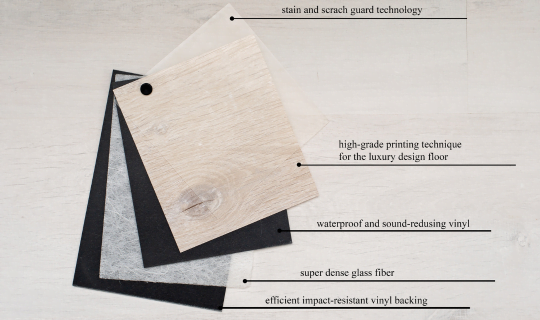
- Backing Layer: This is the initial layer of vinyl flooring. Often composed of materials like felt or fiberglass, the backing layer lends additional insulation and soundproofing to the floor.
- Core Layer: This is the primary component that gives vinyl flooring its strength and stability. It’s important to differentiate between Luxury Vinyl Tiles (LVT) and Luxury Vinyl Planks (LVP) versus traditional vinyl tile flooring. LVTs and LVPs tend to have a thicker core layer, enhancing their durability and resistance against scratches and dents. On the other hand, standard vinyl tile flooring usually has a thinner core layer, making it less expensive but also less robust.
- Wear Layer: As the topmost layer, the wear layer is primarily responsible for safeguarding the vinyl floor from scratches, scuffs, and stains. The durability of the vinyl floor is determined by the thickness of this layer – thicker wear layers usually signify more durable flooring.
Having a comprehensive understanding of the different types of vinyl flooring and their constitutive layers is vital when choosing the right vinyl floor for your home or business. Understanding each layer’s role can help you make an informed decision based on your specific needs and preferences.
Exploring the Varieties: The Different Types of Vinyl Flooring
Ready to explore the many varieties of vinyl flooring? Let’s dive into the different types available and find the perfect fit for your space.
Vinyl flooring comes in three main types: vinyl plank flooring, luxury vinyl flooring, and vinyl sheet flooring. Each type offers unique benefits and design options, making it easy to find the perfect flooring for your home or office.
- Vinyl plank flooring mimics the look of hardwood flooring, but with added durability and water resistance. It’s perfect for high-traffic areas and spaces that are prone to moisture, such as bathrooms and kitchens. It’s also available in a variety of colors and styles, allowing you to create a custom look that matches your decor.
- Luxury vinyl flooring is the perfect choice if you’re looking for a high-end look without the high-end price tag. This type of flooring is made to look like natural stone or hardwood, but at a fraction of the cost. It’s also extremely durable, making it ideal for busy households and commercial spaces.
- Vinyl sheet flooring is perfect for large spaces, as it comes in large rolls that can easily be cut to fit any room. It’s also incredibly durable and offers excellent water resistance, making it perfect for bathrooms, laundry rooms, and other high-moisture areas. It’s also available in a variety of colors and designs, so you can find the perfect match for your decor.
When it comes to choosing the right type of flooring for your space, vinyl flooring is an excellent choice. Whether you choose vinyl plank flooring, luxury vinyl flooring, or vinyl sheet flooring, you can rest easy knowing that you’ve made a great investment in your space.
The Economics of Vinyl Flooring
If you’re looking to make a smart investment in your home or office, it’s important to understand the economics of vinyl flooring and how it can benefit your space in both the short and long term.
Vinyl flooring options are cost-effective compared to other flooring materials such as hardwood or tile. Vinyl plank flooring and luxury vinyl flooring are made from durable materials that can last for years, even in high traffic areas. This means that you won’t have to replace your floors frequently, saving you money in the long run.
In addition to being cost-effective, vinyl flooring options also offer a wide range of designs. You can choose from a variety of colors and patterns, including wood and tile designs that mimic the look of natural materials. This allows you to achieve the aesthetic you want without breaking the bank.
And with its easy installation process, you can even save on labor costs by installing vinyl flooring yourself.
The Global Vinyl Flooring Market size is predicted to reach $73 billion by 2030, growing at a CAGR of 8.2% during the forecast period. This data underscores the growing popularity and demand for vinyl flooring, indicating that it’s not just a passing trend but a sustainable and economically viable choice for many homeowners and businesses. [Source: PR Newswire]
Overall, the economics of vinyl flooring make it an attractive option for those looking to update their space without overspending. Its durability, range of designs, and cost-effectiveness make it a wise investment in the long term.
So if you’re looking for a flooring option that can withstand wear and tear while still looking great, vinyl flooring may be the perfect choice for you.
Where to Install Vinyl Flooring: Best Locations and Practices
Vinyl flooring is a versatile, durable, and water-resistant option that can be installed in various spaces in your home or commercial property. When considering the best locations to install vinyl flooring, there are several areas that stand out. Here are the top locations:
- Bathrooms: One of the primary advantages of vinyl flooring is its water-resistance, making it a perfect choice for bathrooms. Whether you opt for vinyl sheets, planks, or tiles, this type of flooring can withstand the typical moisture and humidity in this space.
- Kitchens: Kitchens, much like bathrooms, can also be prone to spills and moisture. The water-resistant and easy-to-clean nature of vinyl flooring makes it a suitable option for this busy hub of the home.
- Basements: Given its durability and resistance to water damage, vinyl flooring is also ideal for basements. Whether the basement serves as a game room, home gym, or storage area, vinyl flooring can hold up to heavy traffic and potential dampness.
- Commercial Spaces: In commercial areas, vinyl flooring’s resilience and sound-absorbing properties make it a popular choice. Ideal locations within these spaces include high-traffic areas such as lobbies, hallways, and offices.
- Hospitals and Schools: For the same reasons, vinyl flooring is also popular in hospitals and schools. It provides a surface that is not only robust and easy to maintain but also offers a level of noise reduction, which is beneficial in these environments.
By considering these locations for installing vinyl flooring, you can take full advantage of its practicality and versatility while ensuring that your floors will remain attractive and durable for years to come.
Commercial Vinyl Flooring: A Comparative Study
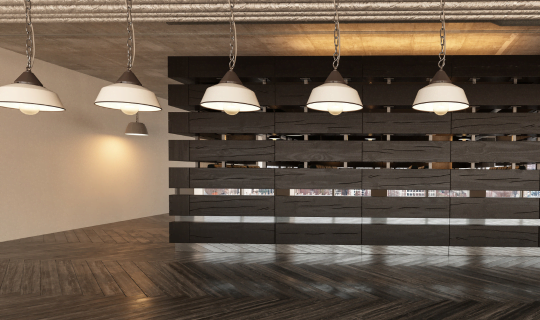
Making a comparative study of commercial vinyl flooring options enables you to make an informed decision about the best type of flooring for your needs.
Three key forms of vinyl flooring are:
- Luxury Vinyl Flooring: This is a high-end option that mimics the aesthetics of hardwood or stone flooring while being composed of synthetic materials.
- Vinyl Composite Tile (VCT): Composed of vinyl chips, limestone, and other synthetic materials, this type of flooring is often used in high-traffic commercial areas.
- Vinyl Sheet Flooring: This type of flooring comes in large sheets, making it an excellent choice for vast spaces.
Several benefits make commercial vinyl flooring a go-to option:
- Water Resistance: It’s a preferred choice for commercial kitchens, bathrooms, and other areas exposed to moisture.
- Ease of Installation and Maintenance: Vinyl flooring is simple to install, maintain, and clean, making it a low-maintenance option for commercial areas.
Despite these benefits, not all vinyl flooring options are identical, necessitating the consideration of various factors such as:
- Durability
- Slip resistance
- Design aesthetic
Working with a reputable supplier or contractor ensures the procurement of high-quality products and reliable installation services.
Popular brands of commercial vinyl flooring are:
- Armstrong
- Mannington
- Shaw
By assessing the different types of vinyl flooring options, understanding their features and benefits, and evaluating your specific needs and requirements, you can make an informed decision on the best-suited flooring type for your commercial space.
Weighing the Pros and Cons: The Advantages and Disadvantages of Vinyl Flooring
Let’s take a look at the pros and cons of vinyl flooring, so you can decide if it’s the right choice for your space.
| Pros | Cons |
|---|---|
| Durability: Vinyl plank flooring is made from durable materials that can withstand heavy foot traffic, making it ideal for high-traffic areas like the kitchen, bathroom, and entryway. | Lifespan: While vinyl flooring is durable, it’s not as long-lasting as other types of flooring like hardwood or tile. |
| Water-Resistance: Vinyl flooring is water-resistant, making it an excellent choice for areas prone to moisture, such as basements, laundry rooms, and bathrooms. | Prone to Damage: Vinyl flooring can be prone to scratches and dents, which can be unsightly. |
| Affordability: Compared to other types of flooring, such as hardwood or tile, vinyl flooring is a budget-friendly option that won’t break the bank. | Not Fully Waterproof: While vinyl flooring is water-resistant, it’s not completely waterproof, which means it may not be the best choice for areas that are constantly exposed to water, like a shower or pool area. |
| Variety of Styles: Vinyl flooring comes in a wide range of styles, colors, and patterns, making it easy to find a design that suits your taste and decor. | – |
| Easy Installation: Vinyl flooring is easy to install, even for those who aren’t experienced with DIY projects. | – |
Ultimately, it’s up to you to weigh the advantages and disadvantages of vinyl flooring to decide if it’s the right choice for your space.
Caring for Your Vinyl Floor: Maintenance and Cleaning Tips
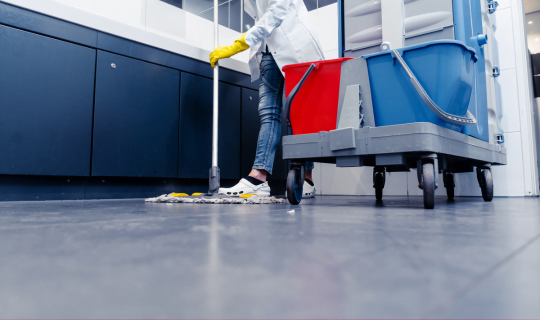
To keep your vinyl plank flooring looking new and in top condition, regular maintenance and cleaning are essential.
Vinyl plank flooring is water-resistant and durable, making it an excellent choice for high-traffic areas in your home. However, neglecting proper care can cause damage and reduce its lifespan.
One of the easiest ways to maintain your vinyl plank flooring is to regularly sweep or vacuum to remove dirt, dust, and debris. Avoid using a beater bar or vacuum with hard bristles that can scratch the surface.
For a deeper clean, use a damp mop or cloth with a mild cleaning solution that’s specifically designed for vinyl flooring. Avoid using harsh chemicals or abrasive scrubbers, which can cause damage and discoloration.
In addition to regular cleaning, it’s essential to take preventative measures to protect your vinyl plank flooring. Place doormats at entryways to prevent dirt and debris from being tracked in, and avoid dragging heavy furniture across the floor.
Spills should be cleaned up immediately to prevent staining or water damage. By following these simple maintenance and cleaning tips, your vinyl plank flooring will remain beautiful and durable for years to come.
Wrapping Up the Vinyl Flooring Discussion
In conclusion, vinyl flooring is an excellent option for those looking for a durable, affordable, and low-maintenance flooring solution.
With a variety of types, brands, and costs available, there is a vinyl flooring option to fit every budget and style preference. Understanding the anatomy of vinyl flooring and its manufacturing process can help you make an informed decision when choosing the right type for your home.
When considering vinyl flooring, it’s important to weigh the pros and cons, as well as understand the best locations and practices for installation.
With proper maintenance and cleaning, vinyl flooring can last for many years and maintain its original appearance. Whether you’re looking for a flooring option for your home or commercial space, vinyl flooring is a versatile and practical choice.
